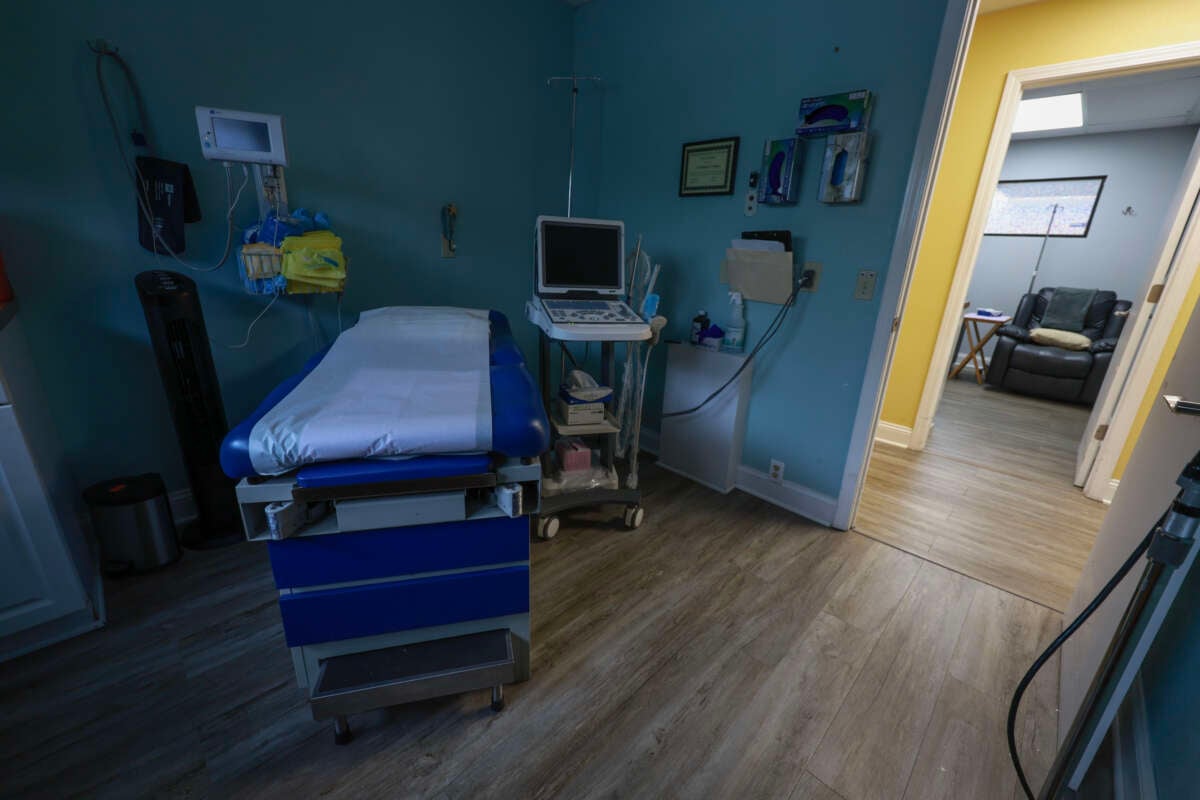Support justice-driven, accurate and transparent news — make a quick donation to Truthout today!
Wait times have increased at 30% of the abortion clinics in the states closest to Florida its draconian six-week abortion ban went into effect on May 1.
The data comes from a survey carried out by Middlebury University economics professor Caitlin Myers and her undergraduate students, which was reported by The Washington Post on Friday.
“Distance and wait times are up… but telehealth is helping meet demand,” Myers wrote on social media, summarizing her findings.
Suspecting that the U.S. Supreme Court would overturn Roe v. Wade in the summer of 2022, Myers began to survey abortion clinics about their wait times starting in March of that year. In her new survey tracking the impact of the Florida ban, Myers and her students called 130 clinics in Florida, Georgia, South Carolina, North Carolina, Virginia, Maryland, and Washington, D.C. They made their first round of calls last month before Florida’s ban went into effect, and the next round on May 13.
Before the ban, the average Florida resident lived 20 miles from a clinic and would need to wait five days to access an abortion. After the ban, the driving distance increased by nearly 30 times to 590 miles and the wait time expanded to almost 14 days.
The Post also conducted its own analysis and found that the ban has forced around 7 million reproductive-age women in Florida and nearby states to travel farther if they need an abortion after six weeks, with the average woman now needing to drive for over seven more hours than before. The paper also found that the ban impacted a larger proportion of Black and low-income women when compared with national demographics.
Further, the Post spoke to clinic workers who detailed some of the individual stories behind the data.
Fort Lauderdale clinic director Eileen Diamond recounted the story of one woman who had traveled from Houston to Florida in search of an abortion, only learning after an 18-hour drive that Florida had passed its six-week ban. The woman, who was nine-weeks pregnant, then had to drive at least another 12 hours to Virginia and another 17 home.
“This woman was desperate,” Diamond told the Post. “She had used everything she had to come to us.”
Sometimes, different state restrictions can interact to make life even more difficult for those in need of abortion care. North Carolina, the closest state to Florida where abortion is legal after six weeks, requires patients to wait 72 hours between an initial consultation with a physician and the actual procedure, which puts up additional barriers for out-of-state patients. As the Post explained:
One Florida patient recently traveled 23 hours on a Greyhound bus for a consultation appointment at A Woman’s Choice in Charlotte, according to Lakeynn Huffman, the clinic manager—returning home that night because she could not find childcare to cover the full 72 hours she had to wait between appointments.
The woman made the same trip two days later, Huffman said—traveling for a total of 92 hours to get an abortion.
While Florida’s ban has put an additional burden on neighboring clinics, the rush has been less dramatic than after Texas passed its six-week ban in 2021. Myers explained that this is because more women are accessing abortion pills in the mail via telemedicine consultations.
However, the U.S. Supreme Court heard oral arguments last month in Food and Drug Administration v. Alliance for Hippocratic Medicine, a case brought by right-wing anti-abortion activists that seeks to restrict access to the widely used abortion pill mifepristone. The court is expected to issue a final ruling in June.
“Telehealth is really a game changer for abortion access,” Myers told the Post. “But it might be a fragile one.”
Press freedom is under attack
As Trump cracks down on political speech, independent media is increasingly necessary.
Truthout produces reporting you won’t see in the mainstream: journalism from the frontlines of global conflict, interviews with grassroots movement leaders, high-quality legal analysis and more.
Our work is possible thanks to reader support. Help Truthout catalyze change and social justice — make a tax-deductible monthly or one-time donation today.
